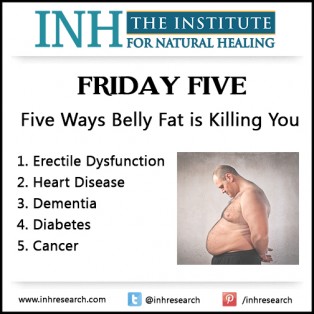A pot belly doesn’t just look bad… It isn’t healthy. Visceral—belly—fat is the most dangerous kind. It could be sabotaging your health. That extra weight may even be taking years off your life. And you may not realize it.
Here are five ways excess belly fat is putting your health at risk:
1. Erectile Dysfunction: That’s right guys… Your belly fat could be preventing proper blood flow to where you want it most. And it’s not just circulation… Your testosterone levels can plummet because of stomach fat. But shrinking your midsection will help.
An Australian study found men who lost 5% to 10% of their body weight over two months helped fix this problem.1 So, let’s say you weigh 200 pounds. That means you’d have to lose about five pounds per month. You can do that without breaking a sweat.
2. Heart Disease: You know extra fat puts your heart in danger. It’s a major cause of heart disease. But fat in your midsection is the most damaging. A study found people carrying higher amounts of stomach fat—compared to other areas—were more at risk for heart disease.2 It can double your risk.3 Abdominal fat keeps blood from getting to important organs…including the heart.
3. Dementia: Health Watch readers know that eating trans fats decreases cognitive function. That’s bad on its own. But a fat buildup is even more dangerous. One study found being overweight alone is a risk. Swedish women in their 70s were more likely to develop dementia in their 80s than women who were two BMI points smaller. That’s about a 12-pound difference.4 And it was belly fat in particular that increased their risk.
Another study revealed people with more belly fat are three times as likely to develop the disease. Even at a normal weight. A bulging belly can increase your dementia risk by as much as 89%.5
4. Diabetes: Research shows a direct link between abdominal fat and insulin resistance.6 It may be all about location. Blood from your gut travels to your liver. It should be used for energy. But fat restricts this. And that’s just the first part of the problem.
More fat makes your liver’s job harder. It means less insulin is turned into energy. This makes blood sugar levels rise…along with your diabetes risk.
5. Cancer: Colon, pancreatic, breast, and uterine cancerrisks all rise with an oversized gut.7 Cancer can start developing in as little as seven years from the fat deposits in your midsection.8
Fat buildup in your core makes organs have to work harder. They can start to malfunction. It also disrupts your hormone balance. This puts you at greater risk for cancers that depend on them. These include breast, colorectal, and ovarian cancers.9
Packing on extra pounds isn’t good for your health. But gaining belly fat can be twice as dangerous. Start by making lifestyle changes. Lay off the sugar. Set aside time for a 20 minute walk every day. And be sure to get more calcium and vitamin D3.
Like this Article? Forward this article here or Share on Facebook.
References:
1http://www.cnn.com/2011/HEALTH/08/05/erectile.dysfunction.lose.weight/
2http://www.medicalnewstoday.com/articles/263270.php
3http://www.medicaldaily.com/naked-truth-6-dangers-having-beer-belly-322608
4http://www.nia.nih.gov/alzheimers/features/big-belly-bad-brain-examining-body-fats-ties-dementia
5http://www.washingtonpost.com/wp-dyn/content/article/2008/03/26/AR2008032602253.html
6http://www.health.harvard.edu/staying-healthy/abdominal-fat-and-what-to-do-about-it
7http://www.mdanderson.org/patient-and-cancer-information/cancer-information/cancer-topics/prevention-and-screening/exercise/flatabs.html
8Idem
9http://my.clevelandclinic.org/health/diseases_conditions/hic_Estrogen_Dependent_Cancers


